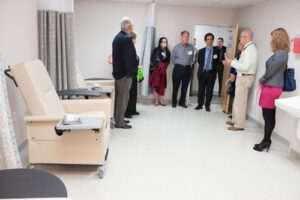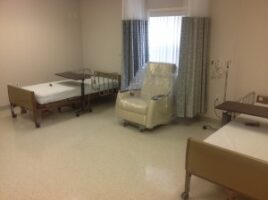This blog post originally appeared on the Michigan Economic Development Corporation blog.

Last month, SRI International launched a new, state-of-the-art, Phase 1 clinical trial facility in the Michigan Life Science and Innovation Center (MLSIC) in Plymouth. We’re thrilled for this new facility to bring even more medical innovation to Michigan; the fully-equipped, 13-bed facility will help emerging and established companies—as well as investigators at academic institutions—develop new therapeutic compounds and medical devices through clinical trials and strategic advisory service.
With support from the Michigan Economic Development Corporation (MEDC), the facility is routed in ideals of collaboration to advance business, innovation and, in this case, human health. SRI is particularly proud that this new facility—along with our productive collaboration with MEDC—will benefit a number of organizations and individuals as well as the greater community.
Initiation of first-in-human (i.e., Phase 1) clinical trials is an important milestone in the development continuum for any compound or medical device. Early-stage trials like these offer the earliest insights into important areas such as safety, tolerability, drug absorption, excretion and potential therapeutic activity. In order to get the most out of Phase 1, you need a combination of solid infrastructure, strategic clinical development support and executional expertise to which many early-stage companies and academic institutions just don’t have access. Fortunately, SRI scientists and staff members have decades of experience developing products that meet medical demands by designing, planning and executing efficient clinical trials and we look forward to helping small to mid-size Michigan biotechnology and medical device companies increase their chances for success, as well as local universities with technology transfer by assisting in intellectual property (IP) evaluation.
Why did SRI select Michigan as the site for its national Phase 1 clinical trial facility?

There is so much by way of innovation in the state, and we are impressed by the MEDC and the state government’s commitment to Michigan’s biotechnology industry. In addition to providing a supportive business environment, Michigan offers critical resources: a deep biomedical sciences and drug development talent pool, proximity to several major medical centers, and a large population that could serve as a source for study volunteers.
The new facility includes everything we need to conduct high quality clinical research. We designed the facility to maximize volunteers’ safety and comfort – the Phase 1 unit mimics a hospital floor plan with a central nurse’s station with an in-house pharmacy, and volunteers will have access to wireless connectivity, a DVD library, cable TV, a kitchen and dining area. We have already hired exceptionally qualified staff members and plan to hire more early next year.
In addition, SRI has consulted for Oakland University, the Oakland University William Beaumont School of Medicine and the Beaumont Research Institute, offering ideas that may further strengthen the research at these excellent institutions.
During our first year, our goal is to assist biotechnology and device companies, locally and throughout the United States, with clinical trials and clinical development strategy for promising experimental products. Keep your eyes peeled for new technologies or research coming from our facility; we’re really excited to work with those in the community to foster a positive environment among those in the biotechnology and device space within Michigan.
We extend our sincere thanks to all those in Michigan who have made us feel welcome and, in doing so, have demonstrated the state’s commitment to advancing technologic innovation. We are kindred spirits in this mission and see terrific opportunities for synergy and improvements in human health.


